9 Things You Need To Know About Deforestation
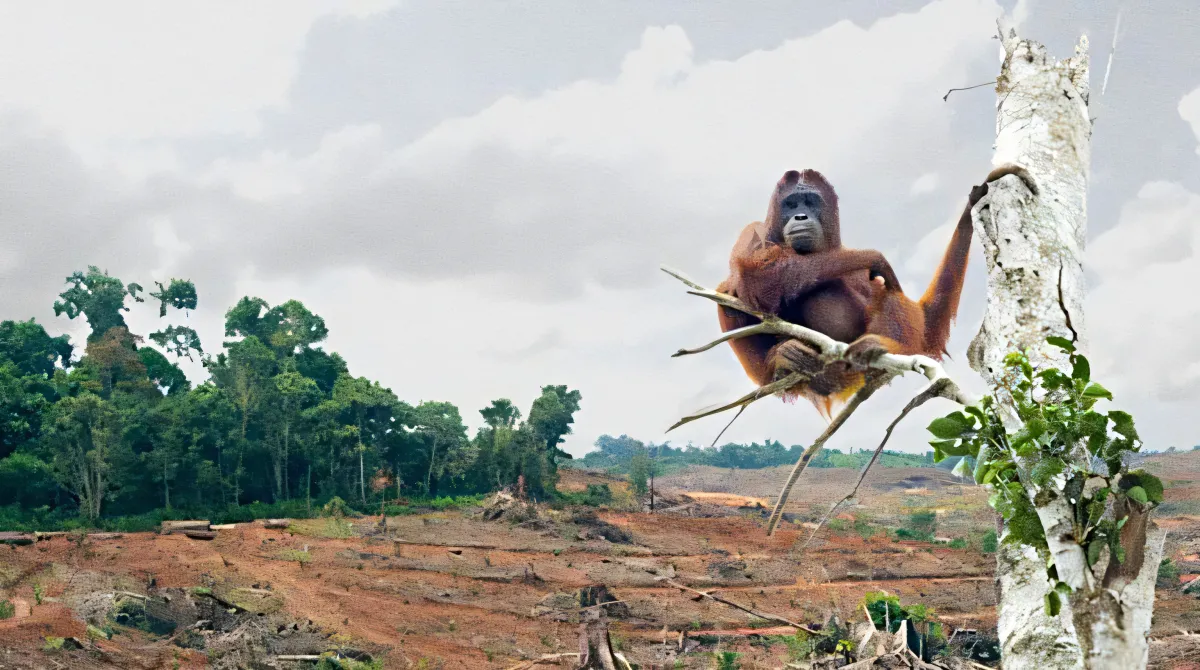
The COP26 summit has been and gone, and the world was hopeful of its leaders coming up with a common-sense unanimous plan of action to halt and potentially reverse climate change. The reality was vague, weak, half-hearted, unachievable pledges; that came reluctantly and begrudgingly from leaders who actually benefit from industrial emissions and deforestation.
The media seemingly want us all divided and arguing about matters like homophobia, transphobia, and racism. While these are important factors we need to eradicate for future generations, these matters keep the really urgent news sidelined, and only serve to shift our focus and sell newspapers.
Page one, every single day, should be deforestation and climate change. However, no one wants to hear that we'll all be desperate for crops, water, air and fuel in 2050. And that affects everyone: no matter what race, sexuality, gender, or creed.
Deforestation is the most pressing issue in the world, as trees play a vital part in trapping carbon dioxide. When a tree is felled it releases all the trapped carbon dioxide into the air, harming the air we breathe, and contributing to global warming. Just one mature tree can absorb 48 pounds of carbon dioxide each year. Currently, 2.47 million trees are chopped down every single day.
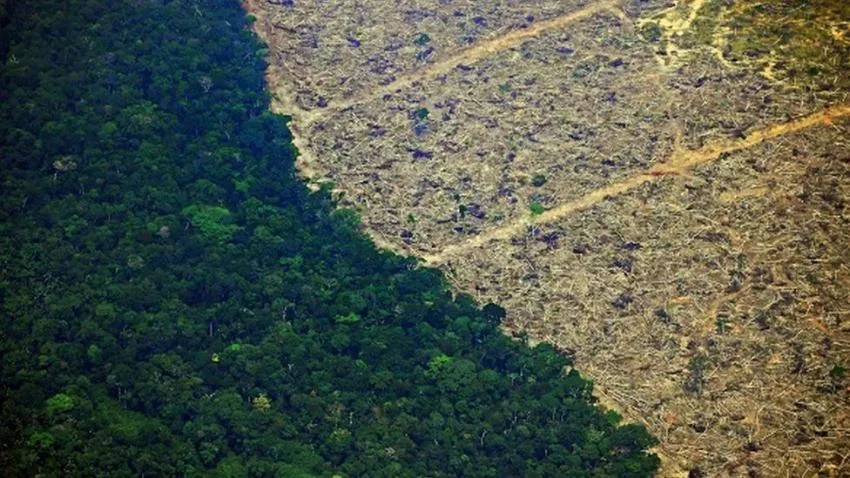
In a world so technologically advanced as ours, with our species becoming the cleverest lifeforms on the planet, it's hard to imagine how we can be so blind and so stupid to the destruction of our own world around us. Humanity in its' greed is consuming trees for wood profits at an eye-watering rate, even in the knowledge of all the detrimental effects of doing so.
Worldwide tree loss would devastate our way of life, and that of millions of other species irrevocably. So why would humanity be so keen to hasten its' own extinction? Have we become the Ouroboros, the serpent eating its' own tail? Here are 9 other considerations to chew on concerning deforestation.

1. The Brazilian government doesn't care about cutting down the Amazon
Deforestation naturally is occurring the world over, but the most notable and pressing area is in the Amazon Rainforest. The Amazon is the most biodiverse area in the world, home to at least 3 million species and over 2,500 species of tree, not to mention around a million Indigenous people. So that's where (for now) we ought to concentrate our efforts. All eyes should be on the Brazilian government, and ask exactly why they allow for so many trees to be felled, species to be made extinct, greenhouse gases to be released, and Indigenous people to be threatened.
Brazilian President Jair Bolsonaro has pledged to end illegal deforestation of the Amazon by 2028, a statement completely at odds with the record high logging rates gathered at the same time. Illegal logging of the Amazon jumped up by a staggering 67% this year compared to last year and has been aided and abetted in general under Bolsonaro's rule. 2028 is 6 years away, which is plenty of time to effectively devastate the biodiversity, and at current rates still destroy at least 438,000,000 acres.
Our weak leaders need to push Brazils' buttons, elect to have Bolsonaro overthrown, and generally put spotlights or live surveillance on the affected areas to name and shame the guilty parties. Many consider Bolsonaro himself as responsible for current Brazil logging rates increasing in recent years, going so far as to accuse him of crimes against humanity.
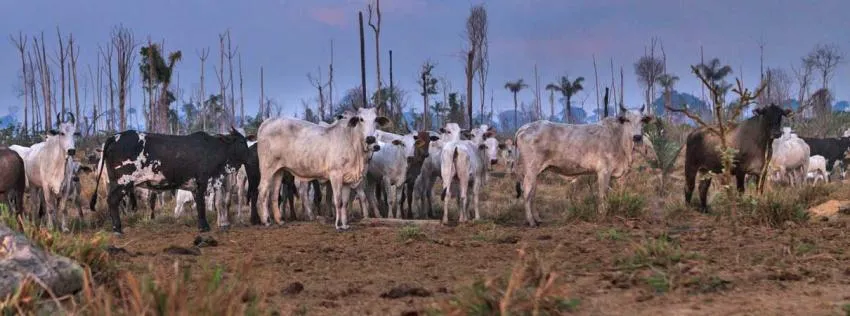
2. Cattle farming is the primary reason for deforestation
Cattle farming, and beef production particularly, account for 80% of the land that has been cleared in the Amazon. The human demand for beef is ever on the rise, so grazing pastures have to be made for more and more cattle. Any guesses where that land gets made? 60% of global arable land is used for beef production. It is estimated that cattle farming alone is responsible for roughly 30% percent of deforestation.
So with such shocking data concerning cattle farming, how do we combat this? It's all well and good keeping cattle at sustainable levels, but the human population isn't sustainable, and nearly everyone wants meat. We can't keep cattle on existing land, because they consume all the crops, and over time that existing land loses its' arability. Aggressive expansion in farming practices demands more space, as animals require more calories to feed than they produce for the humans they feed.
We as a species can greatly reduce our meat intake, look at the packaging for responsibly sourced products, or even omit the meat altogether. Plant-based meats are a progressing market, but the price tag is still higher than that of the 'real thing', so, for now, may not 'kick off' as well as it ought to.
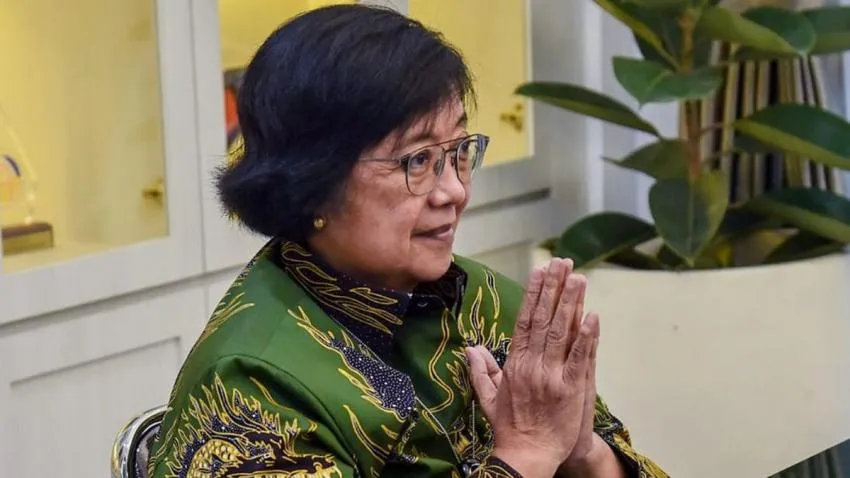
3. Indonesia wants to continue development plans
Indonesia has the third-largest expanse of tropical forest in the world, but illegal logging in recent years has halved its' cover to make way for plantations such as soy. In the past 20 years, roughly 23,000,000 acres have been lost. Indonesian President Joko Widodo recently signed the COP26 2030 deal, but some of his house was less than pleased with this.
Vice Foreign Minister Mahendra Siregar chose to nitpick the terminology and wording around 'deforestation', no doubt in a bid to wheedle through with ongoing development plans.
Indonesian Environment Minister Siti Nurbaya Bakar said that (despite the signing of the COP26 deal) development remains Indonesia's top priority, stating the need to make way for roads. Quite why these proposed roads need to be made now (when life has been perfectly fine without them before now) remains a mystery.
In a Facebook post she said:
"The massive development of President Jokowi's era must not stop in the name of carbon emissions or in the name of deforestation"
"Indonesia's natural wealth, including forests, must be managed for its use according to sustainable principles, besides being fair"
This attitude of refusal is a disappointing hurdle that needs to be reconciled by Indonesia and get on board with the 2030 pledge, not calling it an "unfair" agreement when it is clearly fair for the world as a whole.
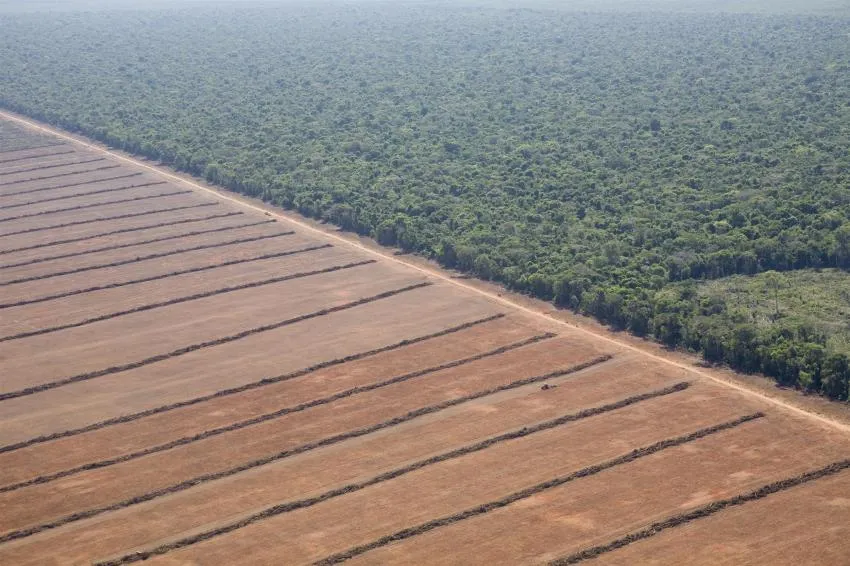
4. Soy and palm oil
Soybean agriculture is another contributor to deforestation, particularly in the US, Brazil, and Argentina, and is imported massively by China. Soy can be found in many everyday products, including animal feeds and meat substitutes. A vicious circle then, for anyone hoping to reduce deforestation by eating plant-based meats to combat beef production. If we all switched to plant-based tomorrow, the soy production demand would still strip back important forestry, but at the reduced methane capacity from cattle.
Palm oil is an incredibly diverse oil that is used in more than half of the packaged food products we buy today. It's in nearly everything we buy, from pizzas to chocolate to lipstick. Its longevity properties, as well as its versatility, make it a highly desirable product for farming.
The problem, however, is that making more palm oil trees requires deforestation to make a 'farm'. Some might argue that it's 'trees replacing trees, so where's the damage?' While still trees in their own right, their lack of biodiversity doesn't make these singular tree forests attractive to any wildlife, so from the animals' perspective, that particular land is still lost. Also, palm oil trees can't trap carbon or oxygenate as effectively as the older trees which are being destroyed.
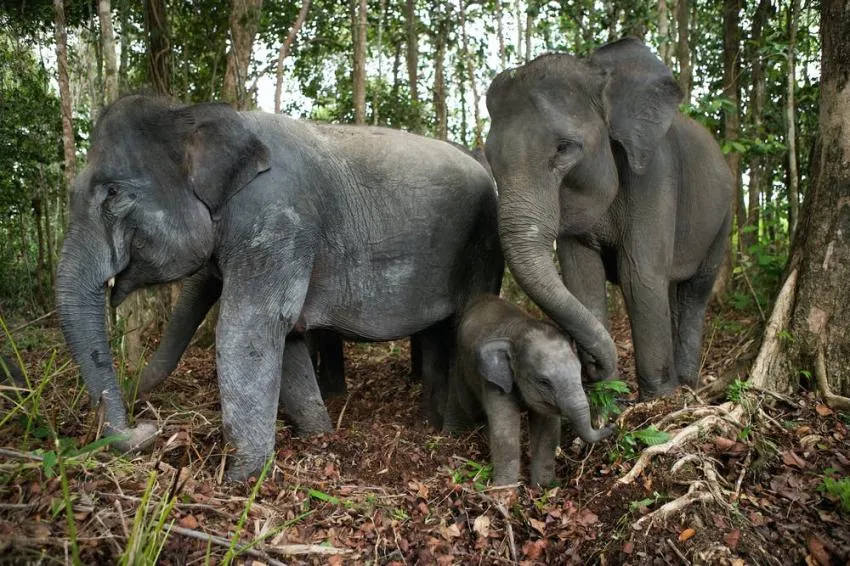
5. Species on the brink of extinction
Many millions of species have already been made extinct or lost their homes to deforestation. Some of the most notable now include Orangutans, pygmy elephants, and Sumatran rhinos. The arrogance of mans' greed has driven many innocent beautiful creatures to their deaths. The Formosan Clouded Leopard, Spix's Macaw, and Mount Glorious Torrent Frog, all gone in the last 20 years in the name of pursuing wood and beef.
Even if we completely halted deforestation right this minute, indefinitely forever, thousands of species wouldn't be able to come back. Evolution perfected them over millions of years, only to now be lost forever in the last century or so, since the invention of the bulldozer and the chainsaw.

6. Companies responsible
Deforestation would be greatly lessened if it didn't have backing from certain financial backers. Whether that is in banks or big-name companies, if the funding sources were named and shamed, perhaps we could expose these clandestine companies into altering their practices. However, apportioning blame onto any one company is difficult, given the shadowy nature of export resources. So just who are a few of the companies that we can point the finger at?
In a report made by NGO Mighty Earth, they stated that Cargill was "one of the biggest companies that contribute to deforestation". Cargill is actively involved in destroying the Amazon to make room for soy and beef production, profiting from its' destruction. They buy irresponsibly sourced cocoa from Ghana, and palm oil from Malaysia and Indonesia. Cargill's customers include McDonald's, Burger King, Walmart, and Unilever. Major household names all, so you see the magnitude of the problem.
Other well-known companies include IKEA, whose suppliers VGSM were blamed last year for using illegally logged wood felled in Ukraine. More recently, they were linked to selling children's furniture made from wood felled illegally in protected Siberian forests.
Another culprit that scores low on the Forest 500 Index is Starbucks. Their demand for paper, pulp, soy, and palm oil is shocking, and have been unable to give adequate proof that they are responsibly sourced. A Wall Street Journal investigation found human rights abuses on Malaysian plantations as well.
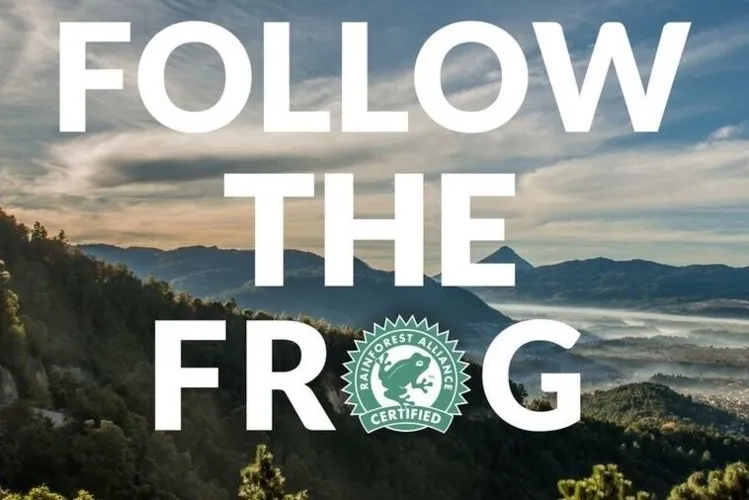
7. Rainforest friendly companies to buy from
So with all the confusion surrounding responsibly sourced goods, who exactly can we as consumers safely buy from? Can we alter the situation with our choices of products that we buy? The general rule of thumb is to Follow The Frog Rainforest Alliance logo that you should see on some popular brands, in some popular stores. You can find the full list here.
Other solutions might be to buy locally sourced fruits and vegetables, like from your local farmers' markets. Here you know there has been no shipping fruit grown in the tropics. There are many eco-friendly laundry products on the market that offer an alternative to the likes of Unilever and Procter & Gamble by using recyclable or minimal packaging and containing less harmful chemicals.
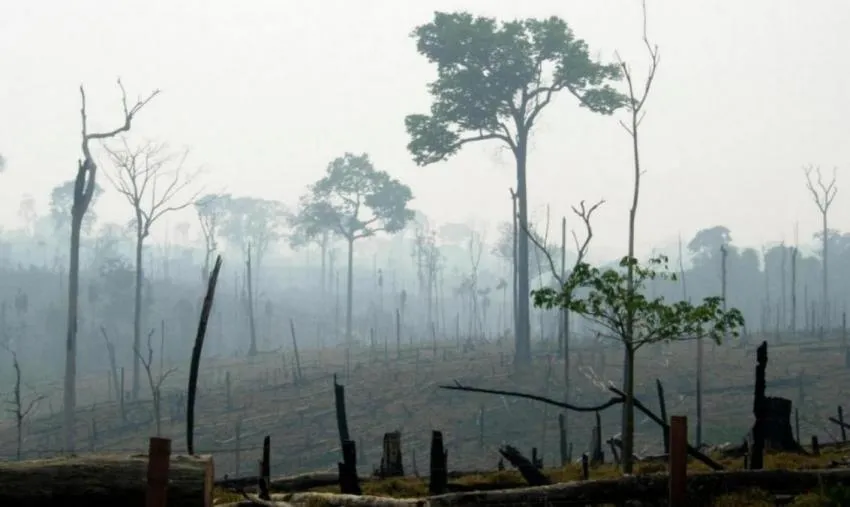
8. What will the world look like in 2050 without action?
The world population is predicted to rise to 9.8 billion by 2050, and to 11.2 billion in 2100. Beef production is already increasing at an unsustainable rate, to the detriment of our precious ecosystem.
If nothing is actively done soon, if no practices are drastically changed for good, then the world as we know it will be chaotic come 2050. Several scenarios have been outlined in the harrowing The Future We Choose by Christiana Figueres and Tom Rivett-Carnac.
Scientists have theorized that the air will be so full of carbon dioxide that the temperature rise will become unbearable. European countries are expected to be around 40 degrees in summer, and equatorial countries to be around 60.
The air will be contaminated with previously dormant diseases, exposed by the ever-melting permafrost. Malaria, dengue, and cholera are expected to attack our immune systems as we've never been exposed to them before. Water will become an even more valuable resource.
Weather conditions will be erratic, giving rise to more storms and tornadoes than ever before. The previously fertile ground will become arid through overuse. We are truly on the brink of an Age of Pestilence.
Migrants from countries that have become too hot will flee to countries that are cooler and economies will topple. Civil unrest, hunger, thirst, and desperation will no doubt lead to conflict and war. This generation will have doomed the next.
9. What Can We Do?
In conclusion, bold decisions in our energy sector need to be implemented soon, but that means investing a serious amount of money, not only in our own countries but in poorer developed countries too, to bring them in line with the 2050 target.
Pledges need to be more than PR small-talk to give the appearance of caring. Certain companies and governments need to check that they are reliably sourced, and swift consequences need to be exacted to those who aren't.
In the meantime what can we as consumers do to lessen the effects of deforestation? For a start, we can lessen our intake of beef, or look into plant-based meats. Ideally, plant-based meats would be cheaper than the 'real thing' to be enticing to customers.
We can go as paperless as possible, wherever possible. In an age where we can send texts, emails, draw on tablet screens, and use screens for writing and spreadsheets, it's hard to see why felling for writing paper is necessary.
We can Follow The Frog with our purchases, to make sure that at least some of the products we consume have been certified by the Rainforest Alliance. In particular with tea and coffee purchases. In turn, we can also check for soy-free or palm oil-free products, though I appreciate that these are few, given how broadly used the latter is.
We can use reclaimed, recycled, or second-hand wood wherever possible, to make sure we're not increasing the demand for felling. For example, furniture made from MDF is perfectly just as serviceable as real wood. It might not be the 'real thing' but a veneer wood effect wardrobe or dresser will serve you just as well. Or you could buy second-hand wooden furniture from charity shops that already exist. You could opt for PVC garden furniture or sheds instead of wood, which is infinitely more weatherproof anyway.
More importantly, we can keep bothering our government. Signing petitions for change, being as vocal as possible on our social media, getting people talking and listening. Donate to some of the various funds like WWF, World Land Trust, and the Rainforest Alliance. It's the best that you and I can do. My own action is this very article, hoping to educate and ire people who can do something more into action.
Opinions and Perspectives
Looking at implementing some of these suggestions at my workplace. Every business should be doing their part.
The fact that we still have to convince people this is a real problem in 2023 is mind-boggling.
Important to remember that sustainable choices often save money in the long run. Its not always about spending more.
Never considered the connection between deforestation and disease spread before. Its not just about trees.
The article really drives home how this issue affects everyone regardless of where we live.
Thinking about how many ancient trees we're losing. It takes generations to replace what we destroy in minutes.
Just signed up to donate monthly to WWF after reading this. Feel like I need to do more than just worry about it.
The mentions of civil unrest and conflict due to environmental issues are sobering. This affects everything.
Been trying to educate my kids about this. They're actually more environmentally conscious than many adults.
Interesting how the article connects deforestation to future migration crises. These issues are all interconnected.
The article makes good points about affordable solutions. Not everyone can make dramatic changes, but we can all do something.
We really need to stop treating this as a future problem. The effects are already happening now.
Those temperature predictions for 2050 are alarming. 40 degrees in Europe would make large areas practically unlivable.
Started using a tablet for note-taking instead of paper. Small change but if everyone did it, imagine the impact.
The section about Indonesian roads reminds me how short-sighted development can be. We need sustainable infrastructure planning.
Just learned about the permafrost diseases mentioned in the article. Thats a scary aspect I hadnt considered before.
Anyone else noticed more extreme weather lately? The article's predictions about 2050 dont seem so far-fetched.
I appreciate how the article balances the big picture with practical steps we can take as individuals.
The suggestion about PVC garden furniture is practical, but I worry about replacing natural materials with more plastics.
Been writing to my local representatives about this issue. They need to know we care about more than just the economy.
The point about soy production is interesting. Even trying to do good by eating plant-based can have unintended consequences.
What worries me most is how some governments seem to be actively working against forest preservation.
My family has started following the Rainforest Alliance certifications for our shopping. Its actually not as hard as we thought.
The statistics about carbon dioxide absorption by trees are mind-blowing. Each mature tree takes in 48 pounds per year.
Looking at the big picture, its clear we need both individual and systemic change to tackle this problem.
True about MDF, but its usually made from waste wood that would otherwise be discarded. Still better than cutting down new trees.
The article mentions MDF as an alternative, but isnt that still made from wood products? We need better alternatives.
I've found some great second-hand furniture pieces lately. No need for new wood products when theres so much already out there.
These companies need more than naming and shaming. We need actual legal consequences for destroying our planets future.
The connection between beef production and deforestation really opened my eyes. Ive switched to having meat-free days each week.
Anyone else think its crazy how the media barely covers this issue? We hear more about celebrity gossip than deforestation.
Just started composting and growing my own vegetables. Small step but feels good to be part of the solution.
The prediction for 2050 is terrifying but feels like a wake-up call. We really need to act now before its too late.
I find it ironic that were destroying forests to plant palm oil trees. Seems like such backward thinking.
The article makes a good point about going paperless. In my office we've cut paper use by 80% just by switching to digital documentation.
We should be putting more pressure on big companies like Cargill and IKEA. They have the power to make real change but choose profits instead.
Interesting point about Follow The Frog certification. I just checked my kitchen and found several products with that label I hadn't even noticed before.
The species extinction part broke my heart. Once these animals are gone, theres no bringing them back.
Anyone else noticed how palm oil is in literally everything? I tried avoiding it and realized its nearly impossible without major lifestyle changes.
I work in construction and we've started using more recycled materials. The demand is definitely growing for sustainable alternatives.
You make a fair point about affordability, but there are still ways we can help without spending more. Using less paper, buying second-hand furniture, these things actually save money.
The Brazilian government's stance is particularly alarming. A 67% increase in illegal logging under Bolsonaro's watch? That's criminal.
Its frightening to think about what the world will look like in 2050 if we continue at this rate. My kids will inherit such a different planet than what we grew up with.
The part about Indonesia's development plans really frustrated me. How can they prioritize new roads over preserving crucial forestland?
That's exactly why governments need to step in and make sustainable options more affordable through subsidies. We can't expect individual consumers to shoulder all the responsibility.
While I agree deforestation is a serious issue, some of these solutions seem unrealistic. Not everyone can afford plant-based alternatives or certified sustainable products.
The statistics about cattle farming are eye-opening. I've actually started reducing my beef consumption after learning about its impact on deforestation.
I found this article deeply concerning. The fact that we're losing 2.47 million trees daily is absolutely staggering. We really need to wake up and take action now.
